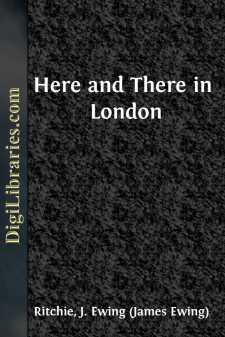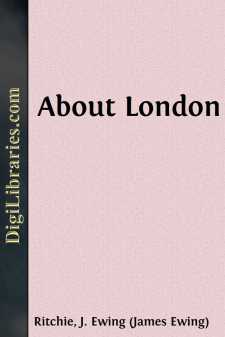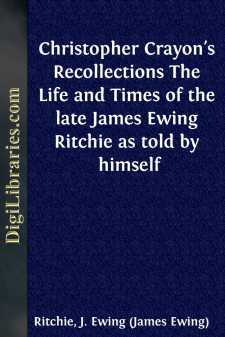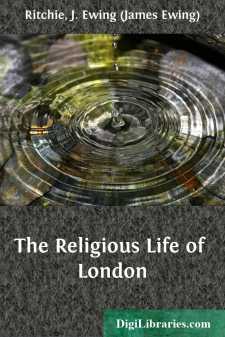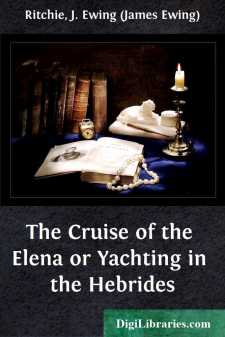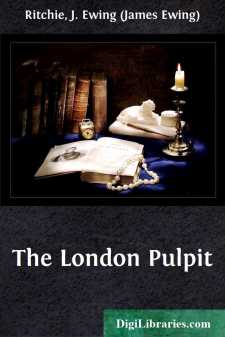Categories
- Antiques & Collectibles 13
- Architecture 36
- Art 48
- Bibles 22
- Biography & Autobiography 813
- Body, Mind & Spirit 142
- Business & Economics 28
- Children's Books 15
- Children's Fiction 12
- Computers 4
- Cooking 94
- Crafts & Hobbies 4
- Drama 346
- Education 46
- Family & Relationships 57
- Fiction 11829
- Games 19
- Gardening 17
- Health & Fitness 34
- History 1377
- House & Home 1
- Humor 147
- Juvenile Fiction 1873
- Juvenile Nonfiction 202
- Language Arts & Disciplines 88
- Law 16
- Literary Collections 686
- Literary Criticism 179
- Mathematics 13
- Medical 41
- Music 40
- Nature 179
- Non-Classifiable 1768
- Performing Arts 7
- Periodicals 1453
- Philosophy 64
- Photography 2
- Poetry 896
- Political Science 203
- Psychology 42
- Reference 154
- Religion 513
- Science 126
- Self-Help 84
- Social Science 81
- Sports & Recreation 34
- Study Aids 3
- Technology & Engineering 59
- Transportation 23
- Travel 463
- True Crime 29
Here and There in London
Description:
Excerpt
Not far from Westminster Abbey, as most of our readers know well, stands the gorgeous pile which Mr. Barry has designed, and for which, in a pecuniary sense, a patient public has been rather handsomely bled. Few are there who have looked at that pile from the Bridge—or from the numerous steamers which throng the river—or loitered round it on a summer’s eve, without feeling some little reverence for the spot haunted by noble memories and heroic shades—where to this day congregate the talent, the wealth, the learning, the wisdom of the land. It is true, there are men—and that amiable cynic, Mr. Henry Drummond, is one of them—who maintain that the House of Commons is utterly corrupt—that there is not a man in that House but has his price; but we instinctively feel that such a general charge is false—that no institution could exist steeped in the demoralisation Mr. Drummond supposes—that his statement is rather one of those ingenious paradoxes in which eccentric men delight, than a sober exposition of the real truth. Mr. Drummond should know better. A poor penny-a-liner of a bilious temperament, without a rap in his pocket, might be excused such cynicism; but it does not become an elderly religious gentleman, well shaven—with clean linen, and a good estate. The House of Commons is a mixed assembly. It contains the fool of quality—the Beotian squire—the needy adventurer—the unprincipled charlatan; but these men do not rule it—do not form its opinion—do not have much influence in it. It is an assembly right in the main. Practically it consists of well-endowed, well-informed business men—men with little enthusiasm, but with plenty of common sense, and with more than average intellect, integrity, and wealth. Still more may be said. All that is great in our land is there. It boasts the brightest names in literature, in eloquence, and in law. Our island-mother has no more distinguished sons than those whose names we see figuring day by day in the division lists. Nowhere can a man see an assembly more honourable, more to be held in honour, for all that men do honour, than the British House of Commons, to which we now propose to introduce the reader.
We suppose it to be the night of an important debate, and that we have an order for the Strangers’ Gallery. As the gallery will not hold more than seventy, and as each member may give an order, it is very clear that at four, when it will be thrown open, there will be more waiting for admission than the place can possibly contain, and that our only chance of getting in will be by being there as early as possible. When Mr. Gladstone brought forward the Budget, for instance, there were strangers waiting for admission as early as ten in the morning. We go down about one, and are immediately directed to a low, dark cellar, with but little light, save what comes from a fire, that makes the place anything but refreshingly cool or pleasant. Being of a stoical turn, we bear our lot in patience, not, however, without thinking that the Commons might behave more respectfully to the sovereign people, than by consigning them to this horrid blackhole. It is in vain we try to read—it is too dark for that; or to talk—the atmosphere is too oppressive even for that slight exertion; and so we wile away the time in a gentle reverie. As soon as this room is full, the rest of the strangers are put into the custody of the police in St. Stephen’s hall. That is a far pleasanter place to wait in, for there is a continual passing to and fro of lords and lawyers, and M.P.’s and parliamentary agents; so that if you do not get into the House, you still see something going on; while in the cellar, you sit, as Wordsworth says—
“Like a party in a parlour,
All silent and all damned.”
At length a bell rings. It is a welcome sound, for it announces that the Speaker is going to prayers. A few minutes, and another ringing makes us aware of the pleasing fact that that gentleman’s devotions have already commenced. We joy to hear it, for we wish that the policeman who has had us in charge, and who has ranged us in the order of our respective débûts, will presently command the first five to get out their orders and proceed. The happy moment at last arrives, and with a light heart we run up several flights of stairs, and find ourselves in The House.
But let us suppose we are fortunate enough to get a Speaker’s order, which admits us to a gallery before the other, and with well stuffed leather cushions. It is hard work sitting all night on bare boards, as one does in the Strangers’ Gallery. We get into the lobby just as the members are going in. What is that the officials are calling out? “Make way for the Speaker.” Of course we will; and as we do so, immediately sweeps by us a gentleman in full-dress, with black breeches, silk stockings, shoes and buckles, and a light Court sword. “Is that the Speaker?” one asks. Oh, no; he is merely Serjeant-at-Arms—he is the man who bears the mace, and sits in a chair of state below the bar, and is terrible in the eyes of refractory, chiefly Irish, M.P.’s, and for all which duties, though he is of the noble family of the House of Bedford, and is brother to Lord John Russell, he condescends to receive £1,200 a year. Well, next to the Serjeant-at-Arms comes the Speaker—the man whose eye aspiring orators find it so difficult to catch. Mr....


